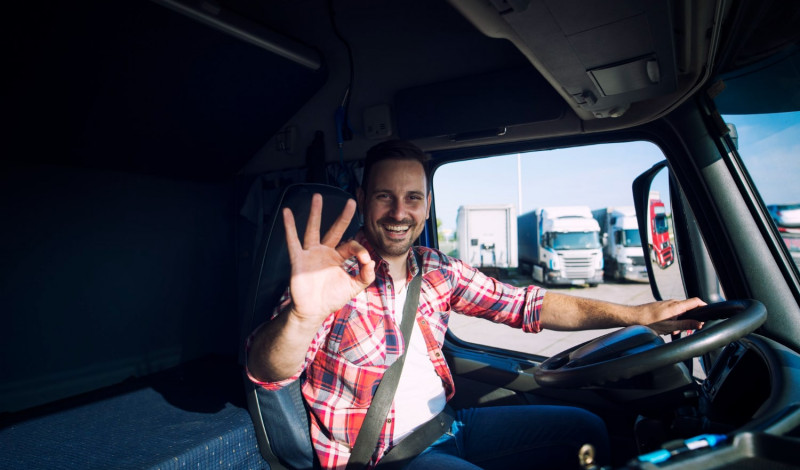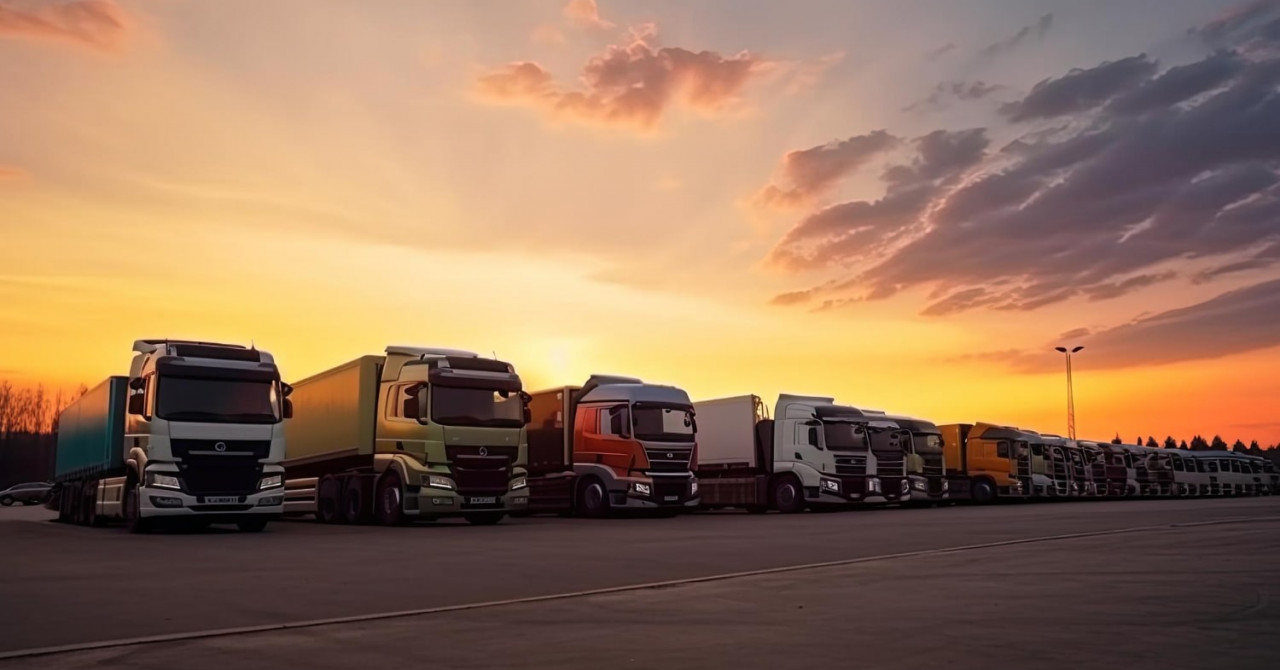News
How USA Trucking Is Shaping the Nation's Economy and Culture
Wednesday, October 4, 2023 at 19:14 pm
Introduction
Every industry has its importance, but some are the very lifeblood of a nation. USA Trucking stands tall among these, representing an economic powerhouse and a cultural emblem of the country's indomitable spirit. This industry exemplifies the American dream:
- The promise of progress
- The thrill of the open road
- The commitment to hard work
Consider for a moment the sheer scale of goods transported daily across the vast expanse of the United States. From the agricultural heartlands of the Midwest to the bustling urban centers on the coasts, trucks play a crucial role in connecting these dots, ensuring that food reaches tables, products find their way to shelves, and essential supplies reach those in need. In doing so, trucking is intricately linked to every facet of American life.
But it's not just about commerce. The trucking industry tells a tale of resilience, determination, and ingenuity. The evolution of trucking parallels the growth of America itself. From the early days of rudimentary transportation to today's sophisticated logistic networks, the industry has constantly adapted, innovated, and thrived. And in the process, it has woven itself into the nation's cultural tapestry.
The open road, for many, is symbolic of freedom and opportunity. Truckers, with their hands firmly on the wheel, epitomize this spirit. They're not just drivers but explorers, ambassadors, and unsung heroes. They witness sunrises over the Rockies, thunderstorms in the plains, and sunsets on the Pacific, all while carrying the weight of the nation's needs.
The Economic Impact of USA Trucking
The sheer magnitude and scope of USA trucking as an industry cannot be understated. Beyond the vast highways and interstates, the roaring engines, and the behemoth trailers lie an intricate web pivotal in the nation's economic framework. Let's delve deeper into the profound economic impact of this industry.
Contribution to GDP:
One of the most tangible indicators of the significance of an industry is its contribution to the nation's Gross Domestic Product (GDP). Trucking is not merely about transporting commodities; it's about fostering economic growth. With millions of trucks crisscrossing the country daily, the economic benefits proliferate through various avenues. For instance, the fueling stations that dot our highways, the motels and restaurants that serve truckers, and even the manufacturing of the trucks themselves — all contribute to a ripple effect that boosts the GDP substantially.
The freight transported by these trucks represents transactions – purchases and sales that are fundamental to our market economy. Every product we consume, at some point, likely spent time on a truck. Thus, the value of goods moved by the trucking industry becomes a substantial fraction of the GDP, making the industry an undeniable cornerstone of the American economic structure.
Employment opportunities:
The trucking industry doesn't just move goods; it profoundly moves people's lives. Beyond the evident employment of drivers, the sector creates many jobs that are often overlooked. The entire logistics chain, from dispatchers coordinating routes to technicians maintaining the trucks, from safety inspectors ensuring compliance to administrative staff managing the back-end processes, all owe their livelihoods to this industry.
Moreover, trucking plays a central role in job creation in peripheral industries. The diners along the highways, the motels providing a night's rest, the service stations and repair shops – all these businesses thrive symbiosis with trucking, creating jobs and supporting local economies.
Consider the life of a trucker. Beyond the job, they need tools, clothing, electronics, and countless other products and services that cater to their unique lifestyle and needs. This demand leads to more niches and more job opportunities. It's a cycle of economic stimulation deeply rooted in the trucking ecosystem.
Support to other industries:
No industry operates in isolation. But few industries can claim to be as intertwined with others as trucking. The timely delivery of goods is the lifeblood of commerce. From the raw materials required in manufacturing to the finished products gracing retail shelves, trucking is the silent force that keeps the supply chain moving.
Take the automotive industry, for example. A car is not just manufactured; its various parts come from different corners of the country or even the world. USA Trucking ensures these parts arrive on time to keep the assembly lines running. The same applies to sectors like pharmaceuticals, where timely delivery can mean the difference between life and death, or agriculture, where perishable goods must reach markets swiftly.
Retailers, especially in the age of online shopping, heavily rely on the trucking industry to meet consumer demands. An efficient trucking network ensures that businesses can promise and meet delivery times, a critical factor in customer satisfaction in today's fast-paced world.
In essence, the trucking industry is like the veins of the American economy, carrying the lifeblood that keeps the system vibrant, alive, and thriving. Its economic significance, both direct and indirect, shapes the nation's financial landscape in ways that few other industries can match.
The Cultural Significance of Trucking in America
The deep, resonant hum of a truck engine, the gleam of the morning sun on a freshly waxed cab, the image of a lone trucker steering his way through vast landscapes—these are not just images and sounds but symbols. They are cultural artifacts representing much more than the sum of their parts. The trucking industry, particularly in America, is not merely a means of transport; it's a cultural phenomenon that has deeply impacted the American psyche. Let's delve into the intricate tapestry of trucking and its significance in the American cultural landscape.
The Trucker as an American Icon:
Historically, America has always celebrated the rugged, self-reliant individual. The cowboy riding the vast plains and the gold miner in the Wild West are figures romanticized for their independence and bravery. Enter the modern era, and the trucker seamlessly fits into this archetype. Representing a unique blend of the old and new, truckers carry with them the legacy of the pioneers but on the modern highways of the USA.
Over the decades, truck drivers have come to symbolize the untamed, independent American spirit. The vastness of the American continent, with its diverse landscapes, can be isolating. Still, for the trucker, this isolation represents freedom—the freedom to explore, chart one's path, and venture into the unknown. This embodiment of freedom, adventure, and the lure of the open road has transformed the trucker into an American icon.
But it's not just about the allure of the road. The life of a trucker demands resilience, determination, and grit—qualities revered in the American ethos. Their life stories, filled with challenges overcome and milestones achieved, testify to the indomitable spirit the country prides itself on.
Cultural Representation in Media:
Pop culture has a profound way of reflecting societal values, and USA trucking has found its way into the heart of American media. Movies, songs, literature—all have at some point celebrated the life and adventures of truckers. Films like "Convoy" and "Smokey and the Bandit" have immortalized the truckers, portraying them as heroes, rebels, and champions of the common man.
Music, too, has played its part. The country and rock genres, particularly, have produced countless ballads dedicated to life on the road, the loves left behind, and the unique challenges truckers face. These songs don't just narrate tales; they resonate with the masses, bridging the gap between the trucker's cab and the living rooms of America.
Literature, both fiction and non-fiction, has delved deep into the psyche of the American trucker. They've explored the solitude, the camaraderie, the joys, and the sorrows of a life on wheels. Through these mediums, trucking is not just an industry; it's a way of life that has left an indelible mark on American pop culture.
Evolution of the "Trucker Culture":
Over time, an entire subculture has evolved around trucking. This isn't just about driving; it's about a way of life that has its symbols, rituals, and jargon. Truck stops, once mere refueling points, have transformed into microcosms of this culture. They are places of rest, recreation, and camaraderie. The chatter over CB radios, once the primary means of communication for truckers, has given birth to a unique terminology that's as much about conveying information as it is about building bonds.
Terms like "18-wheeler," "rig," "bear," and "reefer" might sound like jargon to the outsider, but for those in the trucking world, they are symbols of identity. They signify belonging to a community that understands the unique challenges and joys of the job.
The trucking industry, with its deep roots and wide-reaching impact, has become more than just a commercial venture in America. It's a cultural touchstone that reflects values, aspirations, and the nation's spirit. USA Trucking, in many ways, carries not just goods but the very soul of the country.
Future Prospects for the Trucking Industry
The dynamism of the trucking industry is undeniable. As the world evolves, so too does the realm of trucking, adapting to new challenges, innovations, and societal shifts. The horizons of the future hold intriguing possibilities for this vital sector. Let's journey into what the future might hold for USA Trucking.
Technological Advancements:
The age of technology is upon us, and the trucking industry is poised at the cusp of significant transformation. One of the most anticipated changes comes in the form of electric trucks. With the global push towards sustainability and reducing carbon emissions, electric trucks offer a promising solution. Not only do they promise reduced environmental impact, but they also offer the potential for cost savings in fuel and maintenance.
But electrification is just the tip of the iceberg. The advent of autonomous driving solutions is set to revolutionize the industry further. While the image of trucks barreling down highways without drivers might seem like science fiction, it's rapidly becoming a tangible reality. These autonomous solutions promise to increase efficiency, reduce accidents, and optimize logistics in ways previously unimaginable.
Furthermore, innovations like advanced telematics systems, real-time tracking, and smart logistics solutions are enhancing the operational efficiency of trucking. These technologies offer real-time data predictive analytics and optimize routes, ensuring timely deliveries and reducing operational costs.
Potential Shifts in Cultural Perception:
The archetype of the trucker has been, for the longest time, that of the rugged road warrior—a symbol of freedom and the open road. However, as technology integrates more deeply into the industry, this perception is set to evolve. The trucker of the future might not just be seen wielding a steering wheel but also navigating advanced software, coordinating with artificial intelligence, and optimizing routes with the help of big data.
This shift heralds the image of a more tech-savvy, modern trucker—a professional who straddles the line between traditional trucking values and the brave new world of technology. Tomorrow's stories, songs, and movies might celebrate not just the thrill of the road but also the marvels of innovation, painting a more multidimensional picture of the industry.
Economic Predictions:
The essence of trucking, irrespective of technological advancements, remains transporting goods. And in today's digital age, the demand for this remains higher than ever. E-commerce is experiencing explosive growth, with consumers increasingly preferring online shopping. This surge has direct implications for the trucking industry. The need for timely deliveries, efficient logistics, and the transportation of an ever-increasing array of goods ensures that trucking's economic prospects remain robust.
Moreover, with globalization, the movement of goods isn't confined to domestic boundaries. International trade, cross-border deliveries, and global supply chains ensure that trucking will remain integral to the global economic machinery. As retail, manufacturing, and agriculture sectors continue to grow and diversify, the trucking industry has ample opportunities to expand and thrive.
While challenges will inevitably arise—be it in the form of regulatory changes, environmental concerns, or technological disruptions—the inherent adaptability of the industry ensures its resilience. With its deep roots and vast experience, USA Trucking is particularly well-poised to navigate these changes, ensuring its continued relevance and prominence in the nation's financial and cultural landscapes.
Conclusion
The intricate dance of progress and tradition defines the USA trucking industry. Its roar on the highways is more than just the sound of engines—it's the heartbeat of a nation that has seen the industry grow, adapt, and transform while staying true to its foundational values.
As we've journeyed through the industry's historical, economic, and cultural facets, one thing stands clear: trucking in the USA is not just a profession or an industry; it's a testament to the American spirit. The vast landscapes that trucks traverse echo the stories of pioneers, adventurers, and everyday heroes who, behind the wheel, have shaped the nation's very fabric.
Economically, the industry has been a formidable pillar, supporting myriad sectors and ensuring that the rhythm of commerce never skips a beat. But beyond the numbers and financial charts, there lies a deeper narrative. USA Trucking has intertwined itself with the cultural soul of America. It has etched its legacy through movies, songs, literature, and collective memories. Truckers, with their tales of the open road, represent freedom, resilience, and the quintessential American dream.
As technology paves new paths and the world around us shifts, the trucking industry is poised to navigate these changes with the same determination it has always shown. But amidst all this evolution, its core remains unaltered. It remains a symbol of connection—connecting cities and towns, businesses and consumers, and, most importantly, the past and the future.
In wrapping up our exploration, it's evident that USA Trucking is more than just wheels on the road. It's a celebration of a rich heritage, a nod to the present, and a hopeful gaze into the future. As America moves forward, the trucking industry promises to be right there, with its blend of grit and innovation, steering the nation towards new horizons.
You might also want to read
recommended posts



 English
English

Comments
Post a Comment
Your e-mail address will not be published. Required fields are marked *
Cancel Reply